Stay Informed
Popular Articles
- Hiatal Hernia: Hidden Cause of Chronic Illness
- Small Intestinal Bacterial Overgrowth (SIBO)
- Applied Lymphology: Unlocking the Secret to Pain Relief
- An Introduction to Constitutional Iridology
- The Low Down on Liver Detoxification
- An Energetic and Emotional Approach to Cancer
- Fat Facts
- Marrow in the Bones
- Blood Type and Nutrition
- Cardiac Herbs: Beyond Hawthorn
Quick Search
The School of Modern Herbal Medicine




Adaptogens to the Rescue
- 7/30/2014
- Categorized in: Herbs & Herbalism
 Given the pressures of modern life, none of us are immune to stress. Unexpected bills, the loss of one’s job, personal or family health problems, traffic jams and other daily challenges can produce emotional stress, but our bodies’ are also subject to physical and biochemical stress as well. They have to deal with household chemicals, environmental chemicals, chemicals in our food, loss of sleep and other factors that interfere with optimal wellness. All this can overwhelm the body’s ability to cope, resulting in insomnia, fatigue, anxiety, depression and even physical illness.
Given the pressures of modern life, none of us are immune to stress. Unexpected bills, the loss of one’s job, personal or family health problems, traffic jams and other daily challenges can produce emotional stress, but our bodies’ are also subject to physical and biochemical stress as well. They have to deal with household chemicals, environmental chemicals, chemicals in our food, loss of sleep and other factors that interfere with optimal wellness. All this can overwhelm the body’s ability to cope, resulting in insomnia, fatigue, anxiety, depression and even physical illness.
Fortunately, nature has provided us with herbal remedies that can help you cope with all of the stresses your body, mind and spirit experience. Adaptogens can help you feel calmer and perform better when dealing with life’s day-to-day challenges. They can also help the body normalize its function when you’re faced with strenuous physical activity, loss of sleep and other physical and biochemical forms of stress.
What is an Adaptogen?
The term adaptogen was coined by Russian scientist Dr. Nikolai Lazarev in the late 1940s following research done on eleuthero root. In 1968, Israel I. Brekhman, PhD and Dr. I. V. Dardymov formally defined adaptogens as plants with three characteristics. First, adaptogens are nontoxic, which means they can be safely taken for extended periods of time. Second, an adaptogen produces a nonspecific biological response that improves the body’s ability to resist multiple forms of stress, including physical, chemical and biological stressors. And third, adaptogens have a normalizing influence, meaning that whatever direction the stressors are throwing the body out of balance, adaptogens help to bring the system back into balance.
All the herbs that have been identified as adaptogens have these characteristics, but each adaptogenic plant has its own unique set of properties. Also, adaptogenic effects aren’t based on a particular group of chemical compounds, so the “active constituents” of adaptogens vary considerably, but all of them help the body function better under stress.
What Are the Benefits of Adaptogens?
For starters, adaptogens appear to normalize the production of hormones (especially the ones associated with stress). This is explained in detail on page two. In addition to this basic stress-reducing action (or perhaps because of it), adaptogens may also have the following benefits.
Normalizing Immune Function: Most adaptogens help to balance the immune system. This means that they can boost the body’s ability to fight infection and may also reduce hyperactive immune reactions in allergies and auto-immune disorders. In China, adaptogenic herbs are given to people undergoing chemotherapy and radiation treatments for cancer. This is known as Fu Zheng therapy and Chinese research suggests that it helps protect the body from the side effects of chemotherapy and radiation treatments.
 Improving Athletic Performance: Early research on adaptogens demonstrated that they can enhance athletic performance. They appear to help reduce fatigue, improve cardiovascular and respiratory function and aid in building strength and muscle mass. As a result, adaptogens such as rhodiola, eleuthero and cordyceps have been used in Olympic competition, and unlike steroids, they are not banned because they have no harmful side effects.
Improving Athletic Performance: Early research on adaptogens demonstrated that they can enhance athletic performance. They appear to help reduce fatigue, improve cardiovascular and respiratory function and aid in building strength and muscle mass. As a result, adaptogens such as rhodiola, eleuthero and cordyceps have been used in Olympic competition, and unlike steroids, they are not banned because they have no harmful side effects.
Enhancing Mood and Mental Performance: Long-term stress contributes to both anxiety and depression. High stress levels also tend to shut down higher brain function, which can make it difficult to think clearly. Even worse, high levels of the primary stress hormone cortisol actually destroy brain cells and inhibit memory. So, when we’re under a lot of stress, we can not only feel anxious or depressed, we may also have difficulty concentrating and remembering things.
By reducing cortisol levels (as explained below) adaptogens can facilitate better mental focus and clarity during times of stress. They can also help enhance memory and cognitive function as age increases. Many adaptogens are also helpful for reducing anxiety and lifting depression, thus normalizing mood.
Protecting Cardiovascular Health: Adaptogens also have beneficial effects on the cardiovascular system. Many help to protect the heart and regulate blood pressure. Here again, they work both directions. Adaptogens can raise low blood pressure and reduce high blood pressure. They may also have a moderate cholesterol balancing effect.
Balancing Blood Sugar: Cortisol causes the body to convert proteins from the muscles into sugars, which affects blood sugar levels. Some adaptogens help to regulate blood sugar levels and may help with insulin resistance in diabetes. They may also be helpful for low blood sugar or hypoglycemia.
Enhancing Energy: One of the positive effects of adaptogens is that they help to increase a person’s energy and ability to work. In doing this, adaptogens don’t act like stimulants, which raise energy output by using up the body’s energy reserves. Instead, adaptogens appear to increase the body’s energy reserves, giving a person more stamina and endurance. Adaptogens also help people sleep better when they are under stress, allowing a person to have more energy during the day. This makes them particularly helpful for adrenal exhaustion from long-term stress.
Balancing Reproductive Hormones: Adaptogens have positive benefits on the reproductive health of both men and women. In men, adaptogens can enhance sexual desire, performance and fertility, and in women they can enhance desire, improve fertility and relieve PMS and other menstrual irregularities as well as easing menopausal symptoms.
Other Benefits: Some adaptogens protect the liver from chemical toxicity (hepatoprotective effects), while others can enhance eyesight, improve sleep, aid digestion and improve respiratory function. Adaptogens are also widely regarded as anti-aging, helping to maintain health as we grow older, perhaps even increasing longevity. You can learn more about the properties of specific adaptogens on the next page.
How Do Adaptogens Work?
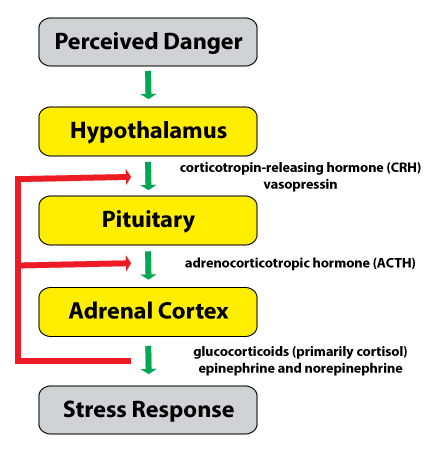 Research suggests that adaptogens relieve stress by modulating the release of stress hormones from the adrenal glands. They do this by affecting the hypothalamus-pituitary-adrenal axis (or HPA axis for short), which is depicted in the graphic on the right.
Research suggests that adaptogens relieve stress by modulating the release of stress hormones from the adrenal glands. They do this by affecting the hypothalamus-pituitary-adrenal axis (or HPA axis for short), which is depicted in the graphic on the right.
The HPA axis works as follows. When the brain perceives danger (stress) it signals the hypothalamus to release the hormone CRH. CRH travels to the pituitary where it stimulates the release of ACTH. ACTH travels through the blood stream to the adrenal cortex where it stimulates the release of cortisol and other glucocorticode hormones. At the same time, the sympathetic nervous system triggers the adrenal medulla to release epinephrine (adrenaline). When cortisol levels rise in the blood, they inhibit the release of CRH and ACTH from the hypothalamus and pituitary, thus shutting down the stress response.
Unfortunately, this cascade can be retriggered by another stressful event. So, when we have a series of stressful situations during the day, the feelings of stress tend to ramp up, increasing feelings of anxiousness and distress.
So, let’s say you have a bad day, one where you face one challenge after the other. You wake up late and skip breakfast. You get caught in a traffic jam that makes late for work. Your boss chews you out. You get an unexpected bill. You find out that a member of your family has a serious illness. As each one of these situations occur, the stress response is turned on and the levels of stress hormones in your body get higher and higher until you feel so wound up you can’t think straight and start making a lot of mistakes. Worse yet, you’re so stressed you can’t get a good night’s sleep.
This is where adaptogens can help. They inhibit the production of CRH and ACTH from the hypothalamus and pituitary, reducing the overall output of stress hormones. This means that the stress hormones don’t ramp up with each stressful event, allowing you to meet life’s challenges with less tension and anxiety, more energy and greater mental clarity.
Major Adaptogenic Herbs
Here are some major adaptogenic herbs to consider trying.
Eleuthero Root
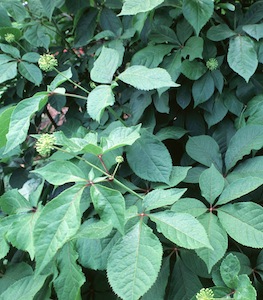 Eleuthero was the first herb identified as an adaptogen and has been researched extensively. In Russia, they conducted hundreds of clinical trials measuring its adaptogenic effects in a wide variety of stressful situations. They documented improvement in mental alertness, energy, work output and the performance of both physical and mental tasks. For example, studies showed that athletes had better stamina, increased oxygen uptake, improved performance and faster recovery when taking eleuthero. Factory workers and truck drivers got sick less often. There were also reports of reduced fatigue and better sleep. Anxiety also decreased in workers and performance improved. Patients receiving drugs for gastric cancer had less damage to the immune system and needed lower doses of those drugs.
Eleuthero was the first herb identified as an adaptogen and has been researched extensively. In Russia, they conducted hundreds of clinical trials measuring its adaptogenic effects in a wide variety of stressful situations. They documented improvement in mental alertness, energy, work output and the performance of both physical and mental tasks. For example, studies showed that athletes had better stamina, increased oxygen uptake, improved performance and faster recovery when taking eleuthero. Factory workers and truck drivers got sick less often. There were also reports of reduced fatigue and better sleep. Anxiety also decreased in workers and performance improved. Patients receiving drugs for gastric cancer had less damage to the immune system and needed lower doses of those drugs.
Eleuthero can reduce the incidence of colds and other infectious diseases. And it can be taken when undergoing conventional cancer treatment to reduce side effects. It is also useful for athletes, people who work night shifts, and aiding mental alertness and memory when a person is under a lot of stress. It can also be helpful for adrenal fatigue and jet lag. Eleuthero root is well tolerated by men, women, teenagers, the elderly and everyone in between. It is unlikely to cause over stimulation, like Asian or Korean ginseng, when taken for long periods. Millions of people in Russia use it regularly.
Ginseng (Korean and American)
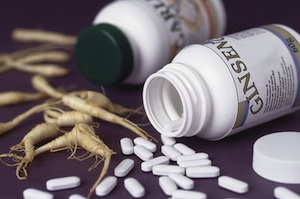 Both Korean (or Asian) ginseng and American ginseng have adaptogenic properties. Korean ginseng is more warming and stimulating, while American ginseng is more cooling and nourishing. American ginseng helps to enhance immune function and reduce stress. It also acts as a digestive tonic and has a general anti-aging effect, helping elderly people stay healthier. Very small doses of American ginseng are needed to create this effect. Just one-quarter of a capsule daily is enough to gradually restore health.
Both Korean (or Asian) ginseng and American ginseng have adaptogenic properties. Korean ginseng is more warming and stimulating, while American ginseng is more cooling and nourishing. American ginseng helps to enhance immune function and reduce stress. It also acts as a digestive tonic and has a general anti-aging effect, helping elderly people stay healthier. Very small doses of American ginseng are needed to create this effect. Just one-quarter of a capsule daily is enough to gradually restore health.
Korean ginseng is more warming or stimulating and is generally more suited for people who are exhausted and feeble. The person who needs Korean ginseng tends to be cold, pale, tired or short of breath. It is very useful for adrenal exhaustion (with dark circles under the eyes and a quivering tongue) and combines well with licorice for this purpose. It may also help middle aged and older men who suffer from a lack of sexual desire and potency.
Cordyceps
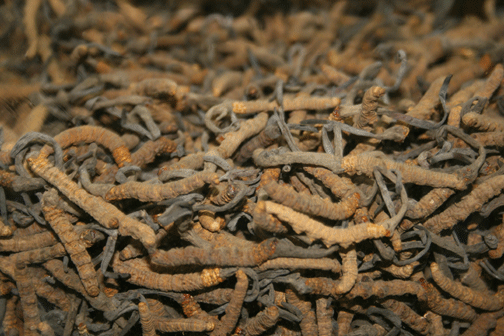 Cordyceps entered Western medicine after the Chinese government demonstrated its efficacy at the Olympic games in Beijing, where the Chinese athletes set new world records in nearly every competition they entered. The spectacular performance of the athletes stimulated a burst of pharmacological and clinical research into its health benefits. Research suggests that cordyceps has a balancing effect on the immune system. It can stimulate the immune system for people who suffer from frequent infections (especially respiratory infections) or who have cancer. It also calms down hyperimmune reactions in people with allergic asthma, hayfever and autoimmune diseases of the kidney.
Cordyceps entered Western medicine after the Chinese government demonstrated its efficacy at the Olympic games in Beijing, where the Chinese athletes set new world records in nearly every competition they entered. The spectacular performance of the athletes stimulated a burst of pharmacological and clinical research into its health benefits. Research suggests that cordyceps has a balancing effect on the immune system. It can stimulate the immune system for people who suffer from frequent infections (especially respiratory infections) or who have cancer. It also calms down hyperimmune reactions in people with allergic asthma, hayfever and autoimmune diseases of the kidney.
He Shou Wu
This traditional anti-aging tonic from Chinese medicine has a reputation for being able to restore hair color in people who are going grey. Traditionally it has been used for dizziness, ringing in the ears, poor vision and low back pain. Research shows it helps protect nerve cells from toxins and has a cholesterol lowering effect. It can help men who suffer from a lack of libido and is also helpful for low thyroid.
Ashwaganda
An important herb from Ayurvedic medicine, ashwaganda is a nervine and adrenal tonic that helps anxiety, depression, exhaustion and poor muscle tone. It reduces the effects of stress, while promoting energy and vitality. It is used as a supporting herb for recovery from debilitating diseases, and is effective for treating sexual dysfunction caused by stress. In addition to helping the adrenal glands, Ashwaganda is also helpful for the thyroid. It boosts the conversion of T4 (the thyroid storage hormone) to T3 (the active thyroid hormone). Generally speaking Ashwaganda is a good adaptogen for women.
Schizandra
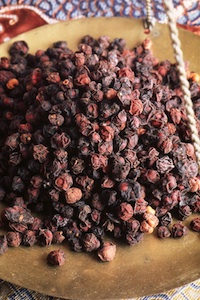 This adaptogen is a general tonic that helps to balance the entire body. It improves circulation, strengthens the heart, aids digestion and increases bile secretion. In traditional Chinese Medicine it is thought to harmonize the body and help one retain energy. It helps to keep the nervous system balanced, increasing both excitatory and inhibitory action. It also has hepatoprotective effects like milk thistle. Schizandra is a good adaptogen for people who tend to run on the dry side, since it helps the body retain moisture.
This adaptogen is a general tonic that helps to balance the entire body. It improves circulation, strengthens the heart, aids digestion and increases bile secretion. In traditional Chinese Medicine it is thought to harmonize the body and help one retain energy. It helps to keep the nervous system balanced, increasing both excitatory and inhibitory action. It also has hepatoprotective effects like milk thistle. Schizandra is a good adaptogen for people who tend to run on the dry side, since it helps the body retain moisture.
Astragalus
Astragalus is an adaptogenic and tonic herb used in Chinese medicine to boost energy and strengthen immunity. Research suggests that the polysaccharides and saponins in astragalus may be helpful to those with heart disease, improving heart function and providing relief from symptoms. It appears to restore immune and adrenal function in people whose immune systems have been weakened by chemotherapy or chronic illness and has antibacterial and antiviral properties. Astragalus may also have benefits in treating allergic asthma.
Holy Basil
Used in Ayurvedic medicine, Holy Basil is a general tonic that protects the heart from stress, lowers blood pressure and cholesterol levels, and stabilizes blood sugar levels. It reduces feelings of stress and down regulates excessive immune responses in conditions like hay fever (allergic rhinitis) and asthma. At the same time it enhances cerebral circulation, memory, concentration and mental acuity.
Rhodiola
Another adaptogen from Russia, rhodiola aids mental clarity, memory, energy, production and stress reduction. It is astringent and drying, so it is not a good adaptogen for people whose constitutions run on the dry side.
Reishi (Ganoderma)
This medicinal mushroom has been shown to have immune enhancing effects as well as acting as a general health tonic. Research suggests that reishi relaxes muscles, improves sleep, eases chronic pain, aids heart function, reduces cholesterol and has antioxidant effects.
Other Adaptogenic Herbs
Other herbs with adaptogenic properties that we haven’t discussed here include gynostemma, licorice, suma and lycium. There are also some less well known herbs that act as adaptogens, including: amla, dang shen, guduchi, jiaogulan, prince seng, rhaponticum, shatavari and shilajit.
Adaptogenic Formulas
Although single adaptogens can be useful, many people find that taking a formula containing several adaptogenic herbs works even better. When you have a lot on your plate and need a boost to help you stay calm and efficient through life’s stressful situations, here are some blends to consider: Active Herbal (Zand), Adaptamax (Nature’s Sunshine Products), Adrenal Balance Compound (Herbalist and Alchemist), Adrenal Caps (Solaray), Adrenal Health (Gaia Herbs), Deep Health (Herbs Etc.), Energy Tonic (Urban Moonshine), Ginseng and Damiana (Solaray), Ginseng Vitality (Yogi Tea), Ginseng/Schisandra Compound (Herbalist and Alchemist), Nervous Fatigue Formula (Nature’s Sunshine Products), Stress Advantage (New Chapter), Stress Manager (Herb Pharm), Stress Response (Gaia Herbs) and Stress Take Care (New Chapter). More options can be found in our Modern Herbal Medicine book.
In addition, you can learn more about adaptogens from the following resources:
Adaptogens: Herbs for Strength, Stamina, and Stress Relief by David Winston and Steven Maimes
Adaptogens in Medical Herbalism: Elite Herbs and Natural Compounds for Mastering Stress, Aging, and Chronic Disease by Donald Yance
